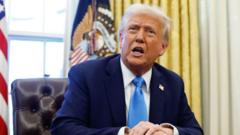In response to President Trump's sanctions against the International Criminal Court (ICC) following arrest warrants for Israeli leaders, numerous countries—including key allies like the UK, Germany, and France—have rallied in support of the ICC, emphasizing its importance to justice and human rights worldwide.
Global Alliance Stands with ICC Against Trump's Sanctions

Global Alliance Stands with ICC Against Trump's Sanctions
Countries unite to support the International Criminal Court following sanctions imposed by US President Trump, highlighting tensions over international law and accountability.
Dozens of countries have voiced "unwavering support" for the International Criminal Court (ICC) in light of sanctions announced by US President Donald Trump, who previously imposed similar measures in 2020. Prominent nations, such as the UK, Germany, and France, have emphasized that the ICC is "a vital pillar of the international justice system." The sanctions were revealed after Trump met with Israel's Prime Minister Benjamin Netanyahu, coinciding with an ICC arrest warrant related to alleged war crimes involving both Israeli and Hamas leaders.
The ICC, as the sole global court designated to prosecute individuals for serious international crimes like genocide and crimes against humanity, has received backing from 79 member states, ignoring a statement from notable absentees such as Australia and Italy. The court had called on its global members and civil societies to unite in defense of justice and human rights, stressing its commitment to providing justice for victims of atrocities. Just last year, it had issued arrest warrants for individuals linked to the ongoing Gaza conflict, drawing sharp criticism from the US, which has condemned the ICC's approach as fostering a "shameful moral equivalency" between Israel and Hamas.
Trump's executive order claims that the ICC's recent actions infringe upon US sovereignty and disrupt foreign policy, labeling the sanctions a response to perceived threats against the work that Washington and its allies do. Observers have raised concerns that these sanctions may jeopardize the ICC’s technical and investigative operations and discourage potential witnesses from coming forward.
Luis Moreno Ocampo, the former chief prosecutor of the ICC, urged states globally to oppose Trump's moves, marking a critical challenge between international justice and unilateral national interests. Although the UN and European leaders have denounced the sanctions and reiterated the ICC's role, Israeli officials have praised the executive order, stating that the court's actions lack legal legitimacy under international law.
Trump's contentious approach aligns with past sanctions issued against ICC officials investigating American actions in Afghanistan, which faced retraction under President Biden. However, Biden also criticized the court's arrest warrant concerning Netanyahu, asserting a lack of equivalence between Israel and Hamas.
In a separate but controversial initiative, Trump recently proposed a plan to "take over" Gaza following widespread denunciation from Arab leaders and the UN. Amid these escalating tensions, a group of nine nations launched the Hague Group last month to defend the ICC's authority, reaffirming its status as a key institution in maintaining global justice and accountability.
With the ICC having issued arrest warrants for various leaders accused of war crimes globally, it remains to be seen how this support from member countries, and the actions of the US, will shape the future of international law and order.



















